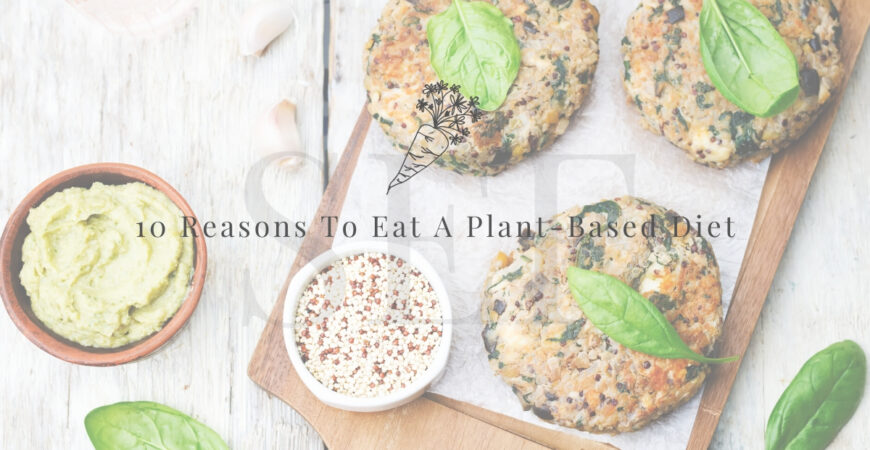This post contains affiliate links #ads. See Disclosure for details. Opinions are my own.
Eating a plant-based diet is one of the fastest-growing food trends worldwide. The number of people moving toward a plant-based diet has been steadily increasing since 2017. So you might be asking yourself, what is it all about? Is this something for me?
What Is A Plant-Based Diet?
A plant-based diet focuses on whole, minimally processed foods. The diet emphasizes eating plants including vegetables, fruits, nuts, seeds, grains, legumes as your primary food sources. This way of eating minimizes or eliminates animal products including meat, dairy, and eggs from your diet.
There have been many studies over the years showing the many health benefits of eating a plant-based diet. Overall, eating a diet high in plants and very low in animal products has been shown to significantly lower one’s risk of developing coronary heart disease, diabetes, stroke, and high blood pressure.
A plant-based diet, when done correctly, contains all the protein, fat, carbohydrates, vitamins and minerals that a person needs for a healthy diet. In fact, studies have shown that a plant-based diet is often higher in fiber and phytonutrients.

Can I Eat Keto and Plant-Based?
Eating a ketogenic diet is also a hot topic right now. A keto diet requires a diet that is high in fat and protein and very low in carbohydrates. So is it possible to eat keto and vegan? Absolutely! There are lots of healthy fats such as:
- coconut oil
- avocado
- extra virgin olive oil
- nut butters ( also a good source of protein)
- flaxseed
- almonds and almond oil
- chia seed
And there are tons of healthy protein sources:
- soybeans
- tofu
- lentils
- nuts
- beans
- tempeh
- chickpeas
- pumpkin seeds
- sunflower seeds
For more info on eating vegan and keto visit here and here.
What Are The Benefits Of Eating Plant-Based?
A plant-based diet is the healthiest way to eat. And it has an incredible number of benefits including the ten I have listed below!
- Weight-loss. A whole foods, plant-based diet naturally makes the stomach feel fuller longer. And research shows that not consuming animal fats and highly processed foods naturally contributes to a smaller waistline. Therefore, weight-loss is a common side effect of eating plant-based.
- Clearer skin. My skin was one first changes I noticed when I began a plant-based diet years ago. The high number of nutrients and vitamins that are being consumed promotes glowing skin, few wrinkles and smoother skin.
- Less inflammation. Before switching to a plant-based I suffered from terrible irritable bowel syndrome (IBS). Fruits, vegetables and whole wheat have been shown to reduce levels of inflammation in the body. Thankfully, eating a high volume of fruits and vegetables has completely eliminated my IBS.
- Good for the planet. Eating a plant-based diet changes the impact of food production. The production of meat and dairy has been proven to significantly contribute to climate change. Animal production only provides 18% of calories, but it contributes to 60% of greenhouse gas emissions. Therefore, removing meat and dairy from your diet helps fight climate change more than any other means.
- Lower risk of heart disease. Recent studies have shown that those who consume little to no animal products are 60% less likely to have a buildup of plaque in their arteries.
- Longer lifespan. Studies have shown that eating this way reduces and helps to prevent chronic diseases, such as diabetes, hypertension, and circulatory disease and more. Therefore, this contributes positively to a longer and healthier lifespan.
- Lowers risk of certain cancers. Eating a whole-foods plant-based diet has been shown to significantly reduce the risk of gastrointestinal cancer and colorectal cancer.
- Hair and nail growth. Again because of the high volume of vitamins and nutrients, you can expect healthy hair and strong nail growth.
- Significantly reduces the risk of stroke. Recent research has shown that people who consume a diet of at least 70% plants reduce the risk of stroke by 20%.
- Significantly reduces the risk of developing diabetes. Studies have demonstrated that those that follow a healthy plant-based diet are 34% less likely to develop diabetes than their unhealthy counterparts.
How To Start Eating Less Meat
First and foremost, always consult your health care provider before making any drastic changes to your health. However, once you know that you’re clear for a big change, making the switch is easy! Here are some tips for getting started:
- Start your day with a superfoods smoothie.
- Change your plate to be at least 50% vegetables.
- Start slow with meatless Monday and gradually increase your meatless days.
- Try new protein sources such as chickpeas, beans, and lentils with your meals.
- Experiment with new flavors.
Looking for some recipe inspiration? Check out my 80 Day Obsession dessert post and my 2B Mindset post.
Have you considered trying a plant-based diet?
- Starting A NEW Fitness Journey At Nearly 40 Years Old! - 06/09/2024
- 30-Day Walking Challenge For Beginners - 12/05/2024
- 3 Simple Things That Healthy People Who DON’T Diet Do Differently - 10/05/2024




Awesome